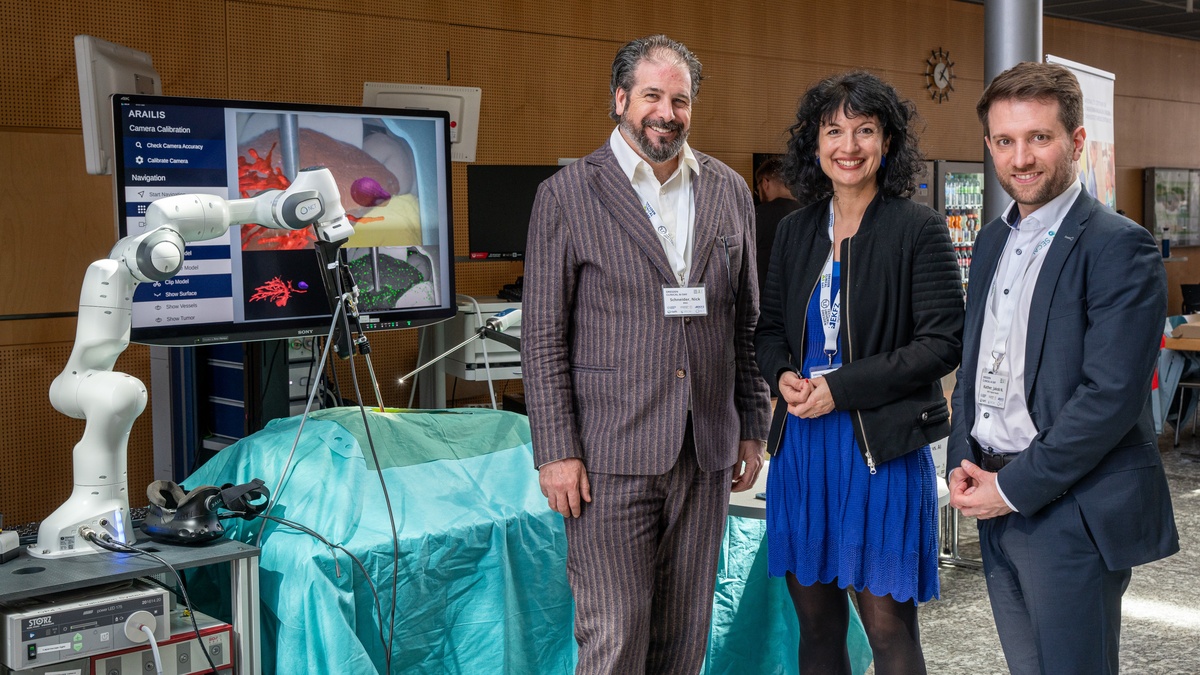 © Michael Kretzschmar/UKD
© Michael Kretzschmar/UKD
April 16, 2024
Dresden Presents Itself as an AI Hotspot at the Clinical AI Day
Interdisciplinary research into AI applications in everyday clinical practice was given a platform to share and present research results and demonstrations at the Dresden Clinical AI Day on the campus of the University Hospital. Around 150 participants were given a wide range of insights into the latest developments and applications of AI in clinical practice, were able to try out demonstrations for themselves and exchange ideas. In addition, representatives from the government provided insights into the federal government's current digital policy initiatives.
Organised by Fellows Prof. Stefanie Speidel and Prof. Jakob N. Kather, the event brought together research groups from the Else Kröner Fresenius Center for Digital Health (EKFZ), the Center for Tactile Internet with Human-in-the-Loop (CeTI) and SECAI as well as experts from various projects funded by the Federal Ministry of Health, such as SurgOmics and Deep Liver. The cooperation and exchange is aimed at advancing these interdisciplinary efforts to integrate various AI applications into everyday clinical practice.
In addition to the presentations, visitors were given insights into the latest developments and applications of clinical AI and were able to test some demonstrations themselves, including the SurgOmics project, which enables the live processing of minimally invasive video data using machine learning methods. This allows important characteristics to be recorded during an operation, such as the degree of bleeding. This relevant information can then be immediately forwarded to the medical team via push messages. The demonstration of the EndoMersion project showed robot-assisted surgery in combination with VR (virtual reality), which will enable remote surgical applications and expert consultations. The projectveiioSense is researching an AI-supported, digital physiotherapy assistant that supports patients with back pain just as well as a physiotherapist with exercises at home using a smart shirt with vibration feedback for movement correction. With over 80 million treatments per year, physiotherapy is one of the most labour-intensive areas of medical care and systems such as veiioSense are intended to reduce the workload.
AI-based software is already being used in many areas to make early diagnoses, deliver examination results more quickly or provide support during surgical procedures. Nevertheless, clinical AI applications face a key challenge: access to sufficient amounts of data. Artificial intelligence requires extensive data sets for its training, which raises the question of how such data can be collected effectively. Prof Jakob N. Kather emphasises that Germany is still lagging behind in this respect: „A lot of data in the healthcare system is not yet digital, but still on paper, and if it is digital, then it is distributed across a large number of computer systems. The data also needs to be centralised and accessible, and then we can use AI methods to find out which therapies are best for our patients“. Due to the social benefits and risks of using medical data, the Clinical AI Day was also dedicated to an exchange between researchers and representatives of the Federal Ministry of Health (BMG) to discuss technologies and fundamental issues relating to data use.
[Excerpts from from EKFZ press release; Successful Clinical AI Day highlighted Dresden as AI Hotspot]




